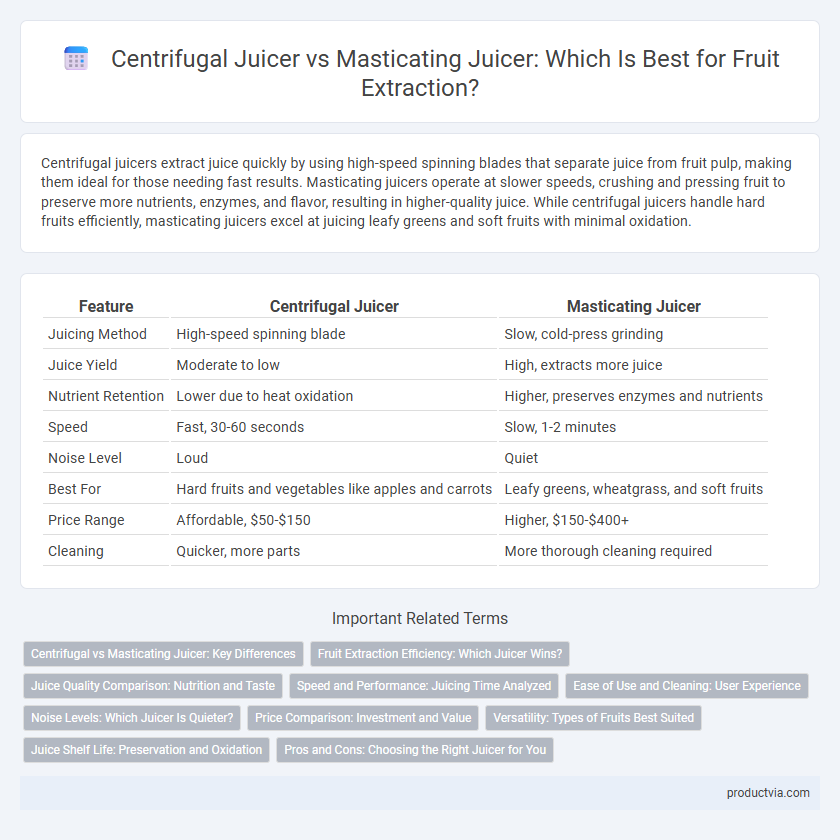Centrifugal juicers extract juice quickly by using high-speed spinning blades that separate juice from fruit pulp, making them ideal for those needing fast results. Masticating juicers operate at slower speeds, crushing and pressing fruit to preserve more nutrients, enzymes, and flavor, resulting in higher-quality juice. While centrifugal juicers handle hard fruits efficiently, masticating juicers excel at juicing leafy greens and soft fruits with minimal oxidation.
Table of Comparison
| Feature | Centrifugal Juicer | Masticating Juicer |
|---|---|---|
| Juicing Method | High-speed spinning blade | Slow, cold-press grinding |
| Juice Yield | Moderate to low | High, extracts more juice |
| Nutrient Retention | Lower due to heat oxidation | Higher, preserves enzymes and nutrients |
| Speed | Fast, 30-60 seconds | Slow, 1-2 minutes |
| Noise Level | Loud | Quiet |
| Best For | Hard fruits and vegetables like apples and carrots | Leafy greens, wheatgrass, and soft fruits |
| Price Range | Affordable, $50-$150 | Higher, $150-$400+ |
| Cleaning | Quicker, more parts | More thorough cleaning required |
Centrifugal vs Masticating Juicer: Key Differences
Centrifugal juicers use high-speed spinning blades to extract juice quickly, resulting in faster processing but potentially more oxidation and foam. Masticating juicers operate at low speeds, crushing and pressing fruits to preserve nutrients, enzymes, and yield higher juice quality with less foam. While centrifugal juicers excel in convenience and speed, masticating juicers are preferred for nutrient retention and efficiency in extracting juice from leafy greens and fibrous fruits.
Fruit Extraction Efficiency: Which Juicer Wins?
Centrifugal juicers excel in speed but often yield lower juice volume with more pulp compared to masticating juicers, which use slow, grinding motion to extract higher juice yield and preserve nutrients. Masticating juicers achieve better fruit extraction efficiency by minimizing oxidation and maximizing juice clarity and shelf life. For optimal fruit juice extraction with superior nutrient retention, masticating juicers are the preferred choice over centrifugal juicers.
Juice Quality Comparison: Nutrition and Taste
Centrifugal juicers extract juice by high-speed spinning, which generates heat and oxidation, potentially reducing nutrient retention and resulting in a less vibrant taste. Masticating juicers operate at low speeds, preserving more enzymes, vitamins, and antioxidants, producing juice with richer flavor and higher nutritional value. Studies show masticating juice maintains up to 30% more vitamin C and yields a fresher, sweeter taste compared to centrifugal juicing.
Speed and Performance: Juicing Time Analyzed
Centrifugal juicers extract fruit juice rapidly by using high-speed spinning blades, typically completing juicing tasks within 30 to 60 seconds. Masticating juicers operate at slower speeds, around 40-80 RPM, resulting in longer juicing times that often exceed one minute but yield higher juice quality and nutrient retention. The trade-off between speed and performance makes centrifugal juicers ideal for quick juice preparation, while masticating juicers prioritize thorough extraction and maximum nutritional benefits.
Ease of Use and Cleaning: User Experience
Centrifugal juicers offer quicker setup and faster juicing due to their high-speed blades, making them easier for users seeking convenience. Masticating juicers require more time for assembly and cleaning but provide a smoother juice with higher nutrient retention. Users focused on ease of use often prefer centrifugal models, while those prioritizing juice quality may accept the additional cleaning effort of masticating juicers.
Noise Levels: Which Juicer Is Quieter?
Masticating juicers operate at slower speeds, producing significantly less noise compared to centrifugal juicers, which spin at high RPMs and generate louder sounds. The quiet operation of masticating juicers makes them ideal for early mornings or noise-sensitive environments. Noise levels in centrifugal juicers often exceed 80 decibels, whereas masticating models typically produce sound below 60 decibels.
Price Comparison: Investment and Value
Centrifugal juicers generally offer a lower upfront price, ranging from $50 to $150, making them accessible for budget-conscious users. Masticating juicers, priced between $200 and $500, represent a higher investment but deliver greater juice yield and nutrient retention due to slower extraction. The value of a masticating juicer increases over time through efficiency and durability, appealing to those who prioritize long-term health benefits and quality.
Versatility: Types of Fruits Best Suited
Centrifugal juicers excel at processing hard, crisp fruits like apples and pears due to their high-speed spinning blades that quickly extract juice. Masticating juicers, with their slow, grinding mechanism, handle soft fruits such as berries and grapes more efficiently while preserving nutrients and enzymes. The versatility of masticating juicers extends to leafy greens and wheatgrass, making them suitable for a wider range of produce compared to centrifugal models.
Juice Shelf Life: Preservation and Oxidation
Centrifugal juicers extract juice quickly using high-speed spinning, which introduces more oxygen and accelerates oxidation, resulting in a shorter shelf life of about 24 to 36 hours. Masticating juicers operate at slower speeds with a cold-press mechanism, minimizing oxidation and preserving enzymes, vitamins, and nutrients, extending juice shelf life up to 72 hours or more when stored properly. For prolonged freshness and nutrient retention, masticating juicers are superior due to their efficient preservation and reduced exposure to oxygen.
Pros and Cons: Choosing the Right Juicer for You
Centrifugal juicers extract fruit juice quickly through high-speed spinning, making them ideal for those seeking fast results; however, they often generate heat and oxidation that can reduce nutrient retention. Masticating juicers operate at slower speeds, preserving more vitamins and enzymes by minimizing heat and oxidation, but they require longer extraction times and typically come with a higher price tag. Selecting between centrifugal and masticating juicers depends on priorities such as juice quality, nutrient preservation, speed, and budget constraints.
Centrifugal juicer vs masticating juicer for fruit extraction Infographic

 productvia.com
productvia.com